【强烈推荐】2019-2020学年度新人教版八年级英语上册全册知识点汇总-预习必备
新人教版英语八年级上各单元知识点大归纳汇编
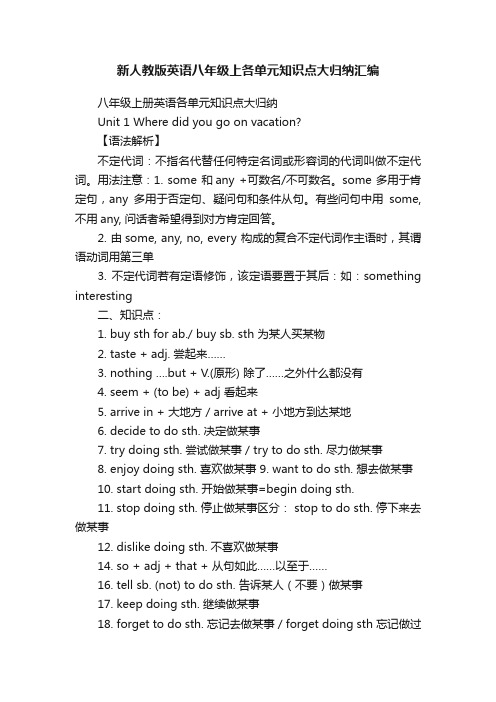
新人教版英语八年级上各单元知识点大归纳汇编八年级上册英语各单元知识点大归纳Unit 1 Where did you go on vacation?【语法解析】不定代词:不指名代替任何特定名词或形容词的代词叫做不定代词。
用法注意:1. some 和any +可数名/不可数名。
some 多用于肯定句,any多用于否定句、疑问句和条件从句。
有些问句中用some,不用any, 问话者希望得到对方肯定回答。
2. 由some, any, no, every 构成的复合不定代词作主语时,其谓语动词用第三单3. 不定代词若有定语修饰,该定语要置于其后:如:something interesting二、知识点:1. buy sth for ab./ buy sb. sth 为某人买某物2. taste + adj. 尝起来……3. nothing ….but + V.(原形) 除了……之外什么都没有4. seem + (to be) + adj 看起来5. arrive in + 大地方 / arrive at + 小地方到达某地6. decide to do sth. 决定做某事7. try doing sth. 尝试做某事 / try to do sth. 尽力做某事8. enjoy doing sth. 喜欢做某事 9. want to do sth. 想去做某事10. start doing sth. 开始做某事=begin doing sth.11. stop doing sth. 停止做某事区分: stop to do sth. 停下来去做某事12. dislike doing sth. 不喜欢做某事14. so + adj + that + 从句如此……以至于……16. tell sb. (not) to do sth. 告诉某人(不要)做某事17. keep doing sth. 继续做某事18. forget to do sth. 忘记去做某事 / forget doing sth 忘记做过某事词语辨析:1. take a photo/ take photos 拍照quite a few+名词复数“许多…”2. seem 形容词看起来….. You seem happy today.to do sth. 似乎、好像做某事 I seem to have a coldIt seems + 从句似乎…. It seems that no one believe you.seem like ….好像,似乎….. It seems like a good idea.3. arrive in +大地点,= get to= reach+地点名“到达...”arrive at +小地点(注:若后跟地点副词here/there/home, 介词需省略,如:arrive here; get home)4. feel like sth/ doing sth. 感觉像是…5. wonder “想知道”,+疑问词(who, what, why)引导的从句。
新人教版英语八年级上各单元知识点大归纳(K12教育文档)

(完整word版)新人教版英语八年级上各单元知识点大归纳(word版可编辑修改)编辑整理:尊敬的读者朋友们:这里是精品文档编辑中心,本文档内容是由我和我的同事精心编辑整理后发布的,发布之前我们对文中内容进行仔细校对,但是难免会有疏漏的地方,但是任然希望((完整word版)新人教版英语八年级上各单元知识点大归纳(word版可编辑修改))的内容能够给您的工作和学习带来便利。
同时也真诚的希望收到您的建议和反馈,这将是我们进步的源泉,前进的动力。
本文可编辑可修改,如果觉得对您有帮助请收藏以便随时查阅,最后祝您生活愉快业绩进步,以下为(完整word版)新人教版英语八年级上各单元知识点大归纳(word版可编辑修改)的全部内容。
八年级上册英语各单元知识点大归纳Unit 1 Where did you go on vacation?【语法解析】不定代词:不指名代替任何特定名词或形容词的代词叫做不定代词。
用法注意:1. some 和any +可数名/不可数名.some 多用于肯定句,any多用于否定句、疑问句和条件从句。
有些问句中用some,不用any,问话者希望得到对方肯定回答. 2。
由some, any, no, every 构成的复合不定代词作主语时,其谓语动词用第三单3. 不定代词若有定语修饰,该定语要置于其后:如:something interesting二、知识点:1. buy sth for ab./ buy sb. sth 为某人买某物2. taste + adj. 尝起来……3。
nothing ….but + V.(原形)除了……之外什么都没有4. seem + (to be) + adj 看起来5。
arrive in + 大地方 / arrive at + 小地方到达某地6. decide to do sth. 决定做某事7。
try doing sth. 尝试做某事 / try to do sth。
人教版八年级英语上册知识点总结和复习要点
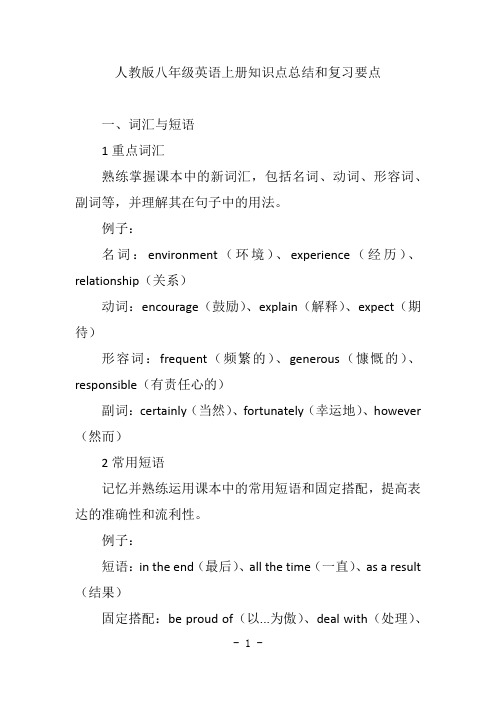
人教版八年级英语上册知识点总结和复习要点一、词汇与短语1重点词汇熟练掌握课本中的新词汇,包括名词、动词、形容词、副词等,并理解其在句子中的用法。
例子:名词:environment(环境)、experience(经历)、relationship(关系)动词:encourage(鼓励)、explain(解释)、expect(期待)形容词:frequent(频繁的)、generous(慷慨的)、responsible(有责任心的)副词:certainly(当然)、fortunately(幸运地)、however (然而)2常用短语记忆并熟练运用课本中的常用短语和固定搭配,提高表达的准确性和流利性。
例子:短语:in the end(最后)、all the time(一直)、as a result (结果)固定搭配:be proud of(以...为傲)、deal with(处理)、pay attention to(注意)二、句型与语法1基本句型熟练掌握五种基本句型,包括主语+谓语、主语+谓语+宾语、主语+谓语+间接宾语+直接宾语、主语+谓语+宾语+宾语补足语、主语+系动词+表语。
例子:主语+谓语:She sings.(她唱歌。
)主语+谓语+宾语:I like apples.(我喜欢苹果。
)主语+谓语+间接宾语+直接宾语:He gave me a book.(他给了我一本书。
)主语+谓语+宾语+宾语补足语:I found the book interesting.(我发现这本书很有趣。
)主语+系动词+表语:She is beautiful.(她很漂亮。
)2时态深入学习并掌握现在完成时、过去进行时、一般将来时、过去将来时等时态的用法和形式。
例子:现在完成时:I have already seen that movie.(我已经看过那部电影了。
)过去进行时:They were playing football when I called them.(我打电话给他们时,他们正在踢足球。
(完整版)最新人教版八年级英语上册知识点总结(全)
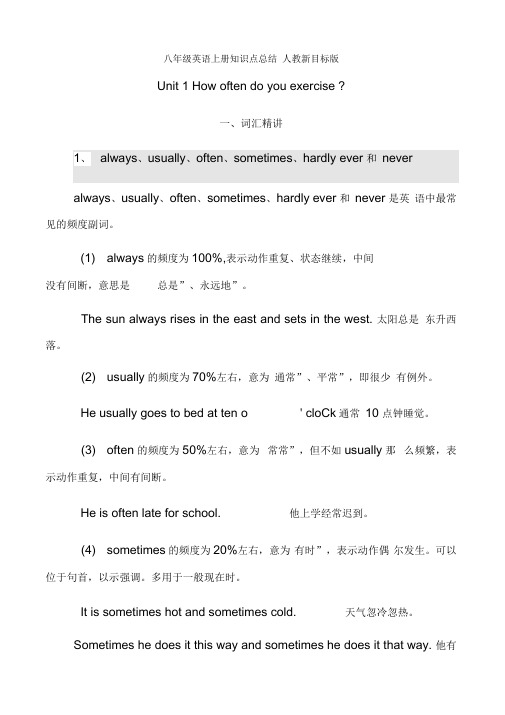
八年级英语上册知识点总结人教新目标版Unit 1 How often do you exercise ?一、词汇精讲always、usually、often、sometimes、hardly ever 和never 是英语中最常见的频度副词。
(1) always的频度为100%,表示动作重复、状态继续,中间没有间断,意思是总是”、永远地”。
The sun always rises in the east and sets in the west. 太阳总是东升西落。
(2) usually的频度为70%左右,意为通常”、平常”,即很少有例外。
He usually goes to bed at ten o ' cloCk通常10 点钟睡觉。
(3) often的频度为50%左右,意为常常”,但不如usually那么频繁,表示动作重复,中间有间断。
He is often late for school. 他上学经常迟到。
(4) sometimes的频度为20%左右,意为有时”,表示动作偶尔发生。
可以位于句首,以示强调。
多用于一般现在时。
It is sometimes hot and sometimes cold. 天气忽冷忽热。
Sometimes he does it this way and sometimes he does it that way. 他有时这样做,有时那样做。
(5) hardly ever的频度为5%左右,意为几乎不”、偶尔”,表频率,位置是行前be后”。
I hardly ever go out these days. 这些天我几乎不出门。
(6) never的频度为0,意为从来不”、泳不”。
My parents are never late for work. 我父母上班从来不迟到。
【拓展】(1) 这些副词在句子中的位置基本相同,一般放在助动词、be 动词或情态动词之后,行为动词之前。
人教版八年级英语上册知识点总结(全新精编)
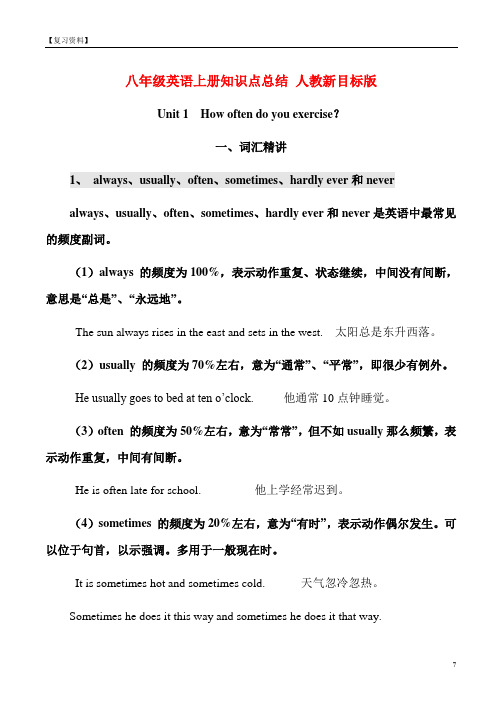
八年级英语上册知识点总结人教新目标版Unit 1 How often do you exercise?一、词汇精讲1、always、usually、often、sometimes、hardly ever和neveralways、usually、often、sometimes、hardly ever和never是英语中最常见的频度副词。
(1)always 的频度为100%,表示动作重复、状态继续,中间没有间断,意思是“总是”、“永远地”。
The sun always rises in the east and sets in the west. 太阳总是东升西落。
(2)usually 的频度为70%左右,意为“通常”、“平常”,即很少有例外。
He usually goes to bed at ten o’clock. 他通常10点钟睡觉。
(3)often 的频度为50%左右,意为“常常”,但不如usually那么频繁,表示动作重复,中间有间断。
He is often late for school. 他上学经常迟到。
(4)sometimes 的频度为20%左右,意为“有时”,表示动作偶尔发生。
可以位于句首,以示强调。
多用于一般现在时。
It is sometimes hot and sometimes cold. 天气忽冷忽热。
Sometimes he does it this way and sometimes he does it that way.他有时这样做,有时那样做。
(5)hardly ever 的频度为5%左右,意为“几乎不”、“偶尔”,表频率,位置是“行前be后”。
I hardly ever go out these days. 这些天我几乎不出门。
(6)never 的频度为0,意为“从来不”、“永不”。
My parents are never late for work. 我父母上班从来不迟到。
【2019-2020】八年级英语上册Unit1PlayingSportsTopic3Theschoolsportsmeetiscoming重点知识点总结及练习新
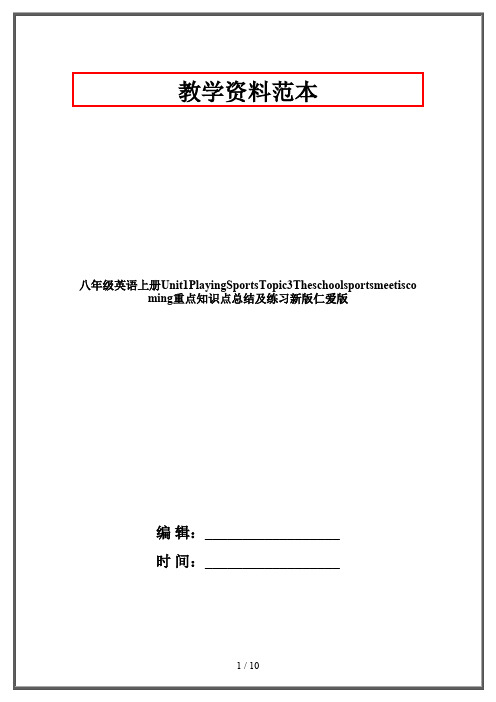
e.g. The white dove is a symbol of peace. 白鸽是和平的象征。
2. They stand for the five parts of the world. 他们代表世界五大洲。
stand 既可用作及物动词,也可用作不及物动词。
A. 用作不及物动词时,stand 可译作 “站(立),位于”等。
e.g. A restaurant stood near the train station. 餐厅位于火车站旁。
B. 用作及物动词时,stand 可译作 “忍受”。
e.g. I couldn’t stand the hot weather. 我不能忍受热天气。
C. stand for 代表、象征;e.g. The white dove stands for peace. 白鸽代表和平。
3. Both are held every four years. 两者都是每四年举办一次。
1) are held 是一般现在时的被动语态,意为“被举办”;2) every four years 每四年; every other day 每隔一天;every +基数词+时间名词的复数,意为“每……/每隔……”e.g. I go to the gym every other day. 我每两天去一次体育馆。
3. More cities will have the chance to hold the Olympics and the Olympic games will be more exciting.更多的国家就有机会举办奥运会,奥运会会变得更加激动。
1) have the chance to do sth. 有机会做某事;e.g. I have the chance to dance. 我有机会跳舞。
2)more exciting是exciting的比较级形式,意为“更加激动人心”。
人教版八年级上册英语知识点总结
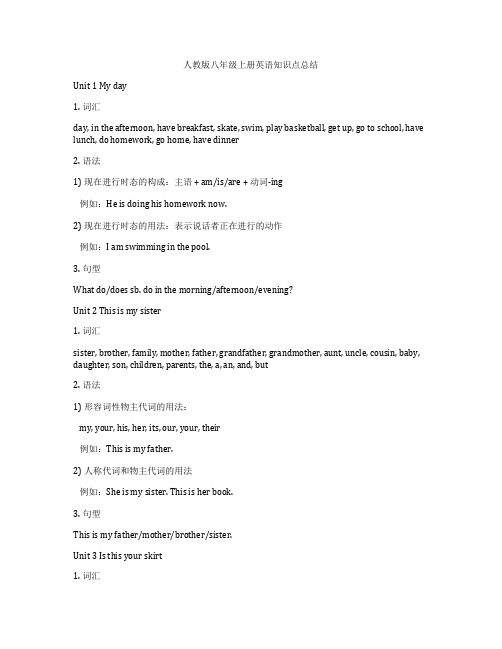
人教版八年级上册英语知识点总结Unit 1 My day1. 词汇day, in the afternoon, have breakfast, skate, swim, play basketball, get up, go to school, have lunch, do homework, go home, have dinner2. 语法1) 现在进行时态的构成:主语 + am/is/are + 动词-ing例如:He is doing his homework now.2) 现在进行时态的用法:表示说话者正在进行的动作例如:I am swimming in the pool.3. 句型What do/does sb. do in the morning/afternoon/evening?Unit 2 This is my sister1. 词汇sister, brother, family, mother, father, grandfather, grandmother, aunt, uncle, cousin, baby, daughter, son, children, parents, the, a, an, and, but2. 语法1) 形容词性物主代词的用法:my, your, his, her, its, our, your, their例如:This is my father.2) 人称代词和物主代词的用法例如:She is my sister. This is her book.3. 句型This is my father/mother/brother/sister.Unit 3 Is this your skirt1. 词汇skirt, this, shirt, hat, dress, sweater, T-shirt, trousers, shoe, cap, socks, the, a, an, and, but 2. 语法1) 物主代词的用法:my, your, his, her, its, our, your, their例如:This is my skirt.2) 物主代词和名词的用法例如:This is my skirt. Is this your skirt?3. 句型Is this/that your skirt/dress/T-shirt?Unit 4 What are you doing?1. 词汇doing, read, writing, making, swimming, riding, drawing, singing, cooking, cleaning2. 语法现在进行时的用法,在口语句中用于表示说话瞬间正在发生的动作。
最新人教版八年级英语上册知识点总结(全)(K12教育文档)
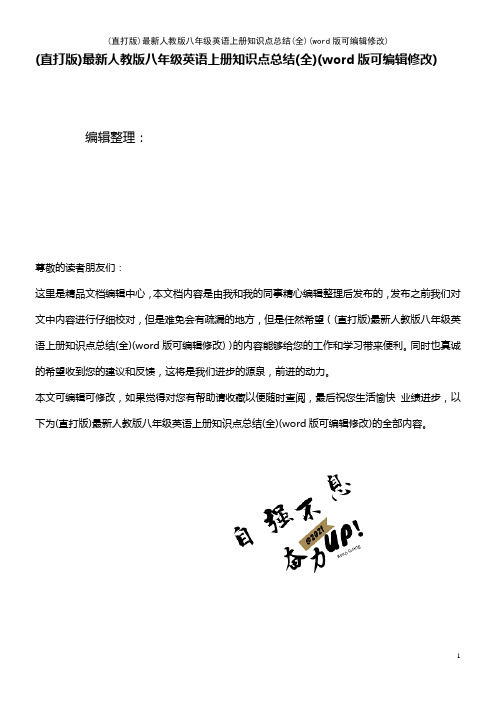
(直打版)最新人教版八年级英语上册知识点总结(全)(word版可编辑修改) 编辑整理:尊敬的读者朋友们:这里是精品文档编辑中心,本文档内容是由我和我的同事精心编辑整理后发布的,发布之前我们对文中内容进行仔细校对,但是难免会有疏漏的地方,但是任然希望((直打版)最新人教版八年级英语上册知识点总结(全)(word版可编辑修改))的内容能够给您的工作和学习带来便利。
同时也真诚的希望收到您的建议和反馈,这将是我们进步的源泉,前进的动力。
本文可编辑可修改,如果觉得对您有帮助请收藏以便随时查阅,最后祝您生活愉快业绩进步,以下为(直打版)最新人教版八年级英语上册知识点总结(全)(word版可编辑修改)的全部内容。
八年级英语上册知识点总结人教新目标版Unit 1 How often do you exercise?一、词汇精讲1、 always、usually、often、sometimes、hardly ever和neveralways、usually、often、sometimes、hardly ever和never 是英语中最常见的频度副词。
(1)always 的频度为100%,表示动作重复、状态继续,中间没有间断,意思是“总是”、“永远地”。
The sun always rises in the east and sets in the west。
太阳总是东升西落。
(2)usually 的频度为70%左右,意为“通常"、“平常”,即很少有例外.He usually goes to bed at ten o’clock. 他通常10点钟睡觉。
(3)often 的频度为50%左右,意为“常常”,但不如usually那么频繁,表示动作重复,中间有间断。
He is often late for school。
他上学经常迟到。
(4)sometimes 的频度为20%左右,意为“有时”,表示动作偶尔发生。
(完整版)人教版八年级上册英语知识点汇总
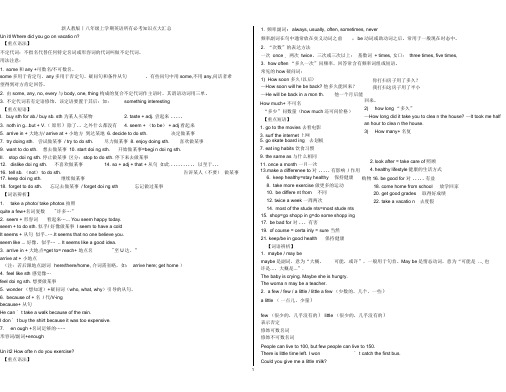
新人教版丨八年级上学期英语所有必考知识点大汇总Un itl Where did you go on vacatio n? 【重点语法】不定代词:不指名代替任何特定名词或形容词的代词叫做不定代词。
用法注意:1. some和any +可数名/不可数名。
some多用于肯定句,any多用于否定句、疑问句和条件从句。
有些问句中用some,不用any,问话者希望得到对方肯定回答。
2. 由some, any, no, every 与body, one, thing 构成的复合不定代词作主语时,其谓语动词用三单。
3. 不定代词若有定语修饰,该定语要置于其后:如:something interesting 【重点短语】I. buy sth for ab./ buy sb. sth 为某人买某物 2. taste + adj. 尝起来 .....3. noth in g...but + V.(原形)除了.. 之外什么都没有4. seem + (to be) + adj 看起来5. arrive in + 大地方/ arrive at + 小地方到达某地6. decide to do sth. 决定做某事7. try doing sth. 尝试做某事/ try to do sth. 尽力做某事8. enjoy doing sth. 喜欢做某事9. want to do sth. 想去做某事10. start doi ng sth. 开始做某事=begi n doi ng sth. II. stop doi ng sth. 停止做某事区分:stop to do sth. 停下来去做某事12. dislike doi ng sth. 不喜欢做某事14. so + adj + that + 从句如此.......... 以至于...16. tell sb. (not) to do sth. 告诉某人(不要)做某事17. keep doi ng sth. 继续做某事18. forget to do sth. 忘记去做某事/ forget doi ng sth 忘记做过某事【词语辨析】1. take a photo/ take photos 拍照quite a few+名词复数"许多…”2. seem + 形容词看起来…... You seem happy today. seem + to do sth. 似乎/ 好像做某事I seem to have a cold It seems + 从句似乎..….It seems that no one believe you. seem like ... 好像,似乎… .. It seems like a good idea.3. arrive in + 大地点=get to= reach+ 地点名"至U达. ”arrive at + 小地点(注:若后跟地点副词here/there/home, 介词需省略,如:arrive here; get home )4. feel like sth 感觉像…feel doi ng sth. 想要做某事5. wonder (想知道)+疑问词(who, what, why)引导的从句。
(简化版)人教版新目标八年级上册英语知识点全册

(简化版)人教版新目标八年级上册英语知识点全册人教版新目标八年级上册英语知识点全册(简化版)单元一:School life- 介绍学校的科目、教室和其他相关信息。
- 研究表达时间和日常活动。
- 研究如何询问和回答有关日常活动和时间的问题。
单元二:Hobbies- 研究谈论个人的爱好和兴趣。
- 研究使用动词的-ing形式。
- 研究询问和回答有关爱好的问题。
单元三:At the weekend- 研究谈论周末的活动和计划。
- 研究使用情态动词can和could表达能力和请求。
- 研究询问和回答有关周末计划的问题。
单元四:My town- 研究描述自己所在的城镇或城市。
- 研究使用介词in, on, at描述地点。
- 研究询问和回答有关地点的问题。
单元五:Health and fitness- 研究谈论健康和健身。
- 研究使用情态动词should表达建议。
- 研究询问和回答有关健康和健身的问题。
单元六:Festivals- 研究谈论各种节日和庆祝活动。
- 研究使用一般现在时描述节日活动。
- 研究询问和回答有关节日和庆祝活动的问题。
单元七:Clothes- 研究谈论衣服和购物。
- 研究使用形容词描述衣服。
- 研究询问和回答有关衣服和购物的问题。
单元八:Inventors and inventions- 研究谈论发明家和发明物。
- 研究使用被动语态描述发明物。
- 研究询问和回答有关发明家和发明物的问题。
单元九:Heroes- 研究谈论英雄和英雄的品质。
- 研究使用情态动词may和might表达推测。
- 研究询问和回答有关英雄的问题。
单元十:Customs and traditions- 研究谈论各种俗和传统。
- 研究使用一般过去时描述过去的俗。
- 研究询问和回答有关俗和传统的问题。
单元十一:World records- 研究谈论世界纪录和成就。
- 研究使用比较级和最高级形容词来描述事物。
- 研究询问和回答有关世界纪录和成就的问题。
【强烈推荐】2019-2020学年度新人教版八年级英语上册全册知识点和单词(共20份)-预习必备
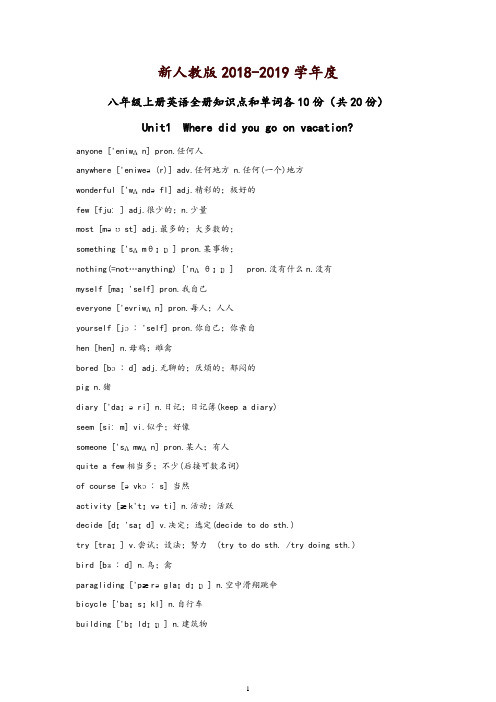
新人教版2018-2019学年度八年级上册英语全册知识点和单词各10份(共20份)Unit1 Where did you go on vacation?anyone ['eniwʌn] pron.任何人anywhere ['eniweə(r)] adv.任何地方 n.任何(一个)地方wonderful ['wʌndəfl] adj.精彩的;极好的few [fjuː] adj.很少的;n.少量most [məʊst] adj.最多的;大多数的;something ['sʌmθɪŋ] pron.某事物;nothing(=not…anything) ['nʌθɪŋ] pron.没有什么n.没有myself [maɪ'self] pron.我自己everyone ['evriwʌn] pron.每人;人人yourself [jɔː'self] pron.你自己;你亲自hen [hen] n.母鸡;雌禽bored [bɔːd] adj.无聊的;厌烦的;郁闷的pig n.猪diary ['daɪəri] n.日记;日记簿(keep a diary)seem [siːm] vi.似乎;好像someone ['sʌmwʌn] pron.某人;有人quite a few相当多;不少(后接可数名词)of course [əvkɔːs] 当然activity [æk'tɪvəti] n.活动;活跃decide [dɪ'saɪd] v.决定;选定(decide to do sth.)try [traɪ] v.尝试;设法;努力 (try to do sth. /try doing sth.)bird [bɜːd] n.鸟;禽paragliding ['pærəɡlaɪdɪŋ] n.空中滑翔跳伞bicycle ['baɪsɪkl] n.自行车building ['bɪldɪŋ] n.建筑物trader ['treɪdə(r)] n.商人;商船wonder ['wʌndə(r)] v.惊奇;想知道;怀疑difference ['dɪfrəns] n.差异;不同top [tɒp] n.顶部;顶wait [weɪt] v.等;等待(wait for)umbrella [ʌm'brelə] n.伞;雨伞wet [wet] adj.湿的;雨天的below [bɪ'ləʊ] prep.低于;在...下面adv.在下面as [əz] conj.如同;像...一样enough [ɪ'nʌf] adj.足够的adv.足够地;充分地duck [dʌk] n.鸭肉;鸭hungry(反full) ['hʌŋɡri] adj.饥饿的;渴望的feel like(doing sth.)想要dislike [dɪs'laɪk] v.不喜欢;厌恶 n.不喜爱;厌恶;反感because of因为;由于have a good time=enjoy oneself=have fun(doing sth.)玩得痛快Unit 1 Where did you go on vacation? go on vacation去度假stay at home待在家里go to the mountains去爬山go to the beach去海滩visit museums 参观博物馆go to summer camp去参观夏令营quite a few相当多study for为……而学习go out出去most of the time大部分时间taste good尝起来很好吃have a good time玩得高兴of course当然feel like给……的感觉;感受到go shopping去购物in the past在过去walk around四处走走because of因为one bowl of…一碗……the next day第二天drink tea喝茶find out找出;查明go on继续take photos照相something important重要的事up and down上上下下come up出来buy sth. for sb. / buy sb. sth.为某人买某物taste + adj. 尝起来……look+adj. 看起来……nothing…but+动词原形除了……之外什么都没有seem+(to be)+ adj. 看起来……arrive in+大地点 / arrive at+小地点到达某地decide to do sth.决定去做某事try doing sth.尝试做某事 / try to do sth.尽力去做某事forget doing sth.忘记做过某事/ forget to do sth.忘记做某事enjoy doing sth.喜欢做某事want to do sth.想去做某事start doing sth.开始做某事stop doing sth. 停止做某事dislike doing sth. 不喜欢做某事keep doing sth.继续做某事Why not do. sth.?为什么不做……呢?so+adj.+that+从句如此……以至于……tell sb. (not) to do sth. 告诉某人(不要)做某事Unit2 How often do you exercise?housework ['haʊswɜːk] n.家务劳动hardly ['hɑːdli] adv.几乎不;简直不;刚刚ever ['evə(r)] adv.曾经;在任何时候once [wʌns] adv.一次;曾经twice [twaɪs] adv.两倍;两次Internet ['ɪntənet] n.因特网program ['prəʊɡræm] n.节目;程序;课程;节目单full [fʊl] adj.满的;充满的;完全的swing [swɪŋ] n.摇摆;秋千v.摇摆;旋转maybe ['meɪbi] adv.或许;也许;可能swing dance摇摆舞least [liːst] adj.最小的;最少的at least至少hardly ever很少;几乎从不;难得junk n.垃圾;废旧杂物coffee ['kɒfi] n.咖啡;咖啡色health [helθ] n.健康;人的身体或精神状态result [rɪ'zʌlt] .结果;后果percent [pə'sent] adj.百分之...的online [ˌɒn'laɪn] adj.在线的adv.在线地television ['telɪvɪʒn] n.电视机;电视节目although [ɔːl'ðəʊ] conj.虽然;尽管;然而;可是through [θruː] prep.穿过;凭借;一直到body ['bɒdi] n.身体mind [maɪnd] .头脑;想法;意见;心思such [sʌtʃ] adj.这样的;如此的together [tə'ɡeðə(r)] adv.共同;一起die [daɪ] v.死;枯竭;消失writer ['raɪtə(r)] n.作者;作家dentist ['dentɪst] n.牙科医生magazine ['mæɡəziːn] n.杂志however [haʊ'evə(r)] adv.然而;无论如何;不管多么than [ðən] conj.比almost ['ɔːlməʊst] adv.几乎;差不多none [nʌn] pron.没有人;没有任何东西,毫无less [les] adj.更少的;较少的point [pɔɪnt] n.看法;要点;重点;小数点;目标;分数such as例如;诸如junk food n.垃圾食品;无营养食品more than超过;多于;不仅仅;非常less than不到;少于Unit2 How often do you exercise? help with housework帮助做家务on weekends在周末how often多久一次hardly ever几乎从不once a week每周一次twice a month每月两次every day每天be free有空go to the movies去看电影use the Internet用互联网swing dance摇摆舞play tennis打网球stay up late熬夜;睡得很晚at least至少have dance and piano lessons上舞蹈课和钢琴课go to bed early早点睡觉play sports进行体育活动be good for对……有好处go camping去野营not…at all一点儿也不……in one’s free time在某人的业余时间the most popular最受欢迎的such as比如;诸如old habits die hard积习难改go to the dentist去看牙医morn than多于;超过less than少于help sb. with sth.帮助某人做某事How about…? ......怎么样?/ ……好不好?want sb. to do sth.想让某人做某事How many+可数名词复数+一般疑问句?……有多少……? 主语+find+that从句. ……发现……spend time with sb.和某人一起度过时光It’s+ adj.+ to do sth. 做某事的……的。
新人教版八年级英语上册各单元知识总结归纳
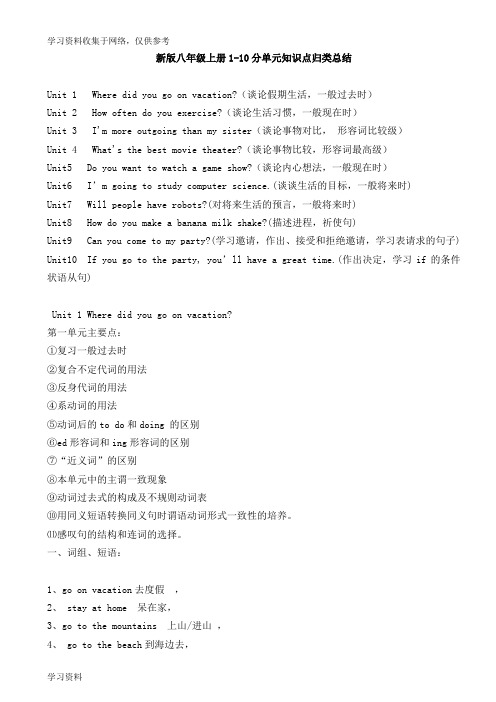
新版八年级上册1-10分单元知识点归类总结Unit 1 Where did you go on vacation?(谈论假期生活,一般过去时)Unit 2 How often do you exercise?(谈论生活习惯,一般现在时)Unit 3 I'm more outgoing than my sister(谈论事物对比,形容词比较级)Unit 4 What's the best movie theater?(谈论事物比较,形容词最高级)Unit5 Do you want to watch a game show?(谈论内心想法,一般现在时)Unit6 I’m going to study computer science.(谈谈生活的目标,一般将来时)Unit7 Will people have robots?(对将来生活的预言,一般将来时)Unit8 How do you make a banana milk shake?(描述进程,祈使句)Unit9 Can you come to my party?(学习邀请,作出、接受和拒绝邀请,学习表请求的句子) Unit10 If you go to the party, you’ll have a great time.(作出决定,学习if的条件状语从句)Unit 1 Where did you go on vacation?第一单元主要点:①复习一般过去时②复合不定代词的用法③反身代词的用法④系动词的用法⑤动词后的to do和doing 的区别⑥ed形容词和ing形容词的区别⑦“近义词”的区别⑧本单元中的主谓一致现象⑨动词过去式的构成及不规则动词表⑩用同义短语转换同义句时谓语动词形式一致性的培养。
⑾感叹句的结构和连词的选择。
一、词组、短语:1、go on vacation去度假,2、 stay at home 呆在家,3、go to the mountains 上山/进山,4、 go to the beach到海边去,5、visit museums 参观博物馆,6、go to summer camp 去夏令营,7、 quite a few 相当多,8、study for为……学习,9、go out 出去,10、most of the time 大部分时间/绝大多数时间,11、taste good 尝起来味道好,12、have a good time玩的开心,13、of course当然可以,14、feel like感觉像……/想要,15、 go shopping购物,16、in the past 在过去,17、walk around绕……走,18、too many 太多(可数名词前面),19、because of 因为,20、one bowl of 一碗……,21、find out 查出来/发现,22、go on继续,23、take photos 照相,24、something important重要的事情,25、up and down上上下下,26、come up出来二、重要句子(语法):Where did you go on vacation?你到哪里去度假了?I went to New York City.我去了纽约城Did you go out with anyone? 你出去带人吗?No, No one was here. Everyone was on vacation.不,没有人在这儿。
2019-2020学年度新人教版八年级英语上册全册知识点和单词(共20份)【推荐】
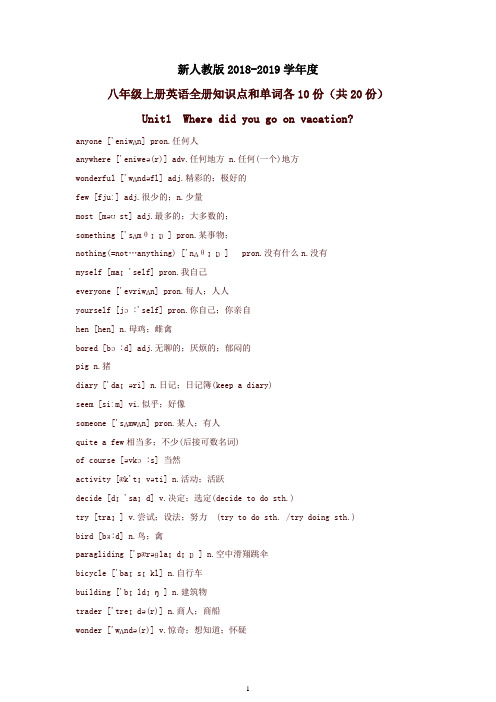
新人教版2018-2019学年度八年级上册英语全册知识点和单词各10份(共20份)Unit1 Where did you go on vacation?anyone ['eniwʌn] pron.任何人anywhere ['eniweə(r)] adv.任何地方 n.任何(一个)地方wonderful ['wʌndəfl] adj.精彩的;极好的few [fjuː] adj.很少的;n.少量most [məʊst] adj.最多的;大多数的;something ['sʌmθɪŋ] pron.某事物;nothing(=not…anything) ['nʌθɪŋ] pron.没有什么n.没有myself [maɪ'self] pron.我自己everyone ['evriwʌn] pron.每人;人人yourself [jɔː'self] pron.你自己;你亲自hen [hen] n.母鸡;雌禽bored [bɔːd] adj.无聊的;厌烦的;郁闷的pig n.猪diary ['daɪəri] n.日记;日记簿(keep a diary)seem [siːm] vi.似乎;好像someone ['sʌmwʌn] pron.某人;有人quite a few相当多;不少(后接可数名词)of course [əvkɔːs] 当然activity [æk'tɪvəti] n.活动;活跃decide [dɪ'saɪd] v.决定;选定(decide to do sth.)try [traɪ] v.尝试;设法;努力 (try to do sth. /try doing sth.)bird [bɜːd] n.鸟;禽paragliding ['pærəɡlaɪdɪŋ] n.空中滑翔跳伞bicycle ['baɪsɪkl] n.自行车building ['bɪldɪŋ] n.建筑物trader ['treɪdə(r)] n.商人;商船wonder ['wʌndə(r)] v.惊奇;想知道;怀疑difference ['dɪfrəns] n.差异;不同top [tɒp] n.顶部;顶wait [weɪt] v.等;等待(wait for)umbrella [ʌm'brelə] n.伞;雨伞wet [wet] adj.湿的;雨天的below [bɪ'ləʊ] prep.低于;在...下面adv.在下面as [əz] conj.如同;像...一样enough [ɪ'nʌf] adj.足够的adv.足够地;充分地duck [dʌk] n.鸭肉;鸭hungry(反full) ['hʌŋɡri] adj.饥饿的;渴望的feel like(doing sth.)想要dislike [dɪs'laɪk] v.不喜欢;厌恶 n.不喜爱;厌恶;反感because of因为;由于have a good time=enjoy oneself=have fun(doing sth.)玩得痛快Unit 1 Where did you go on vacation? go on vacation去度假stay at home待在家里go to the mountains去爬山go to the beach去海滩visit museums 参观博物馆go to summer camp去参观夏令营quite a few相当多study for为……而学习go out出去most of the time大部分时间taste good尝起来很好吃have a good time玩得高兴of course当然feel like给……的感觉;感受到go shopping去购物in the past在过去walk around四处走走because of因为one bowl of…一碗……the next day第二天drink tea喝茶find out找出;查明go on继续take photos照相something important重要的事up and down上上下下come up出来buy sth. for sb. / buy sb. sth.为某人买某物taste + adj. 尝起来……look+adj. 看起来……nothing…but+动词原形除了……之外什么都没有seem+(to be)+ adj. 看起来……arrive in+大地点 / arrive at+小地点到达某地decide to do sth.决定去做某事try doing sth.尝试做某事 / try to do sth.尽力去做某事forget doing sth.忘记做过某事/ forget to do sth.忘记做某事enjoy doing sth.喜欢做某事want to do sth.想去做某事start doing sth.开始做某事stop doing sth. 停止做某事dislike doing sth. 不喜欢做某事keep doing sth.继续做某事Why not do. sth.?为什么不做……呢?so+adj.+that+从句如此……以至于……tell sb. (not) to do sth. 告诉某人(不要)做某事Unit2 How often do you exercise?housework ['haʊswɜːk] n.家务劳动hardly ['hɑːdli] adv.几乎不;简直不;刚刚ever ['evə(r)] adv.曾经;在任何时候once [wʌns] adv.一次;曾经twice [twaɪs] adv.两倍;两次Internet ['ɪntənet] n.因特网program ['prəʊɡræm] n.节目;程序;课程;节目单full [fʊl] adj.满的;充满的;完全的swing [swɪŋ] n.摇摆;秋千v.摇摆;旋转maybe ['meɪbi] adv.或许;也许;可能swing dance摇摆舞least [liːst] adj.最小的;最少的at least至少hardly ever很少;几乎从不;难得junk n.垃圾;废旧杂物coffee ['kɒfi] n.咖啡;咖啡色health [helθ] n.健康;人的身体或精神状态result [rɪ'zʌlt] .结果;后果percent [pə'sent] adj.百分之...的online [ˌɒn'laɪn] adj.在线的adv.在线地television ['telɪvɪʒn] n.电视机;电视节目although [ɔːl'ðəʊ] conj.虽然;尽管;然而;可是through [θruː] prep.穿过;凭借;一直到body ['bɒdi] n.身体mind [maɪnd] .头脑;想法;意见;心思such [sʌtʃ] adj.这样的;如此的together [tə'ɡeðə(r)] adv.共同;一起die [daɪ] v.死;枯竭;消失writer ['raɪtə(r)] n.作者;作家dentist ['dentɪst] n.牙科医生magazine ['mæɡəziːn] n.杂志however [haʊ'evə(r)] adv.然而;无论如何;不管多么than [ðən] conj.比almost ['ɔːlməʊst] adv.几乎;差不多none [nʌn] pron.没有人;没有任何东西,毫无less [les] adj.更少的;较少的point [pɔɪnt] n.看法;要点;重点;小数点;目标;分数such as例如;诸如junk food n.垃圾食品;无营养食品more than超过;多于;不仅仅;非常less than不到;少于Unit2 How often do you exercise? help with housework帮助做家务on weekends在周末how often多久一次hardly ever几乎从不once a week每周一次twice a month每月两次every day每天be free有空go to the movies去看电影use the Internet用互联网swing dance摇摆舞play tennis打网球stay up late熬夜;睡得很晚at least至少have dance and piano lessons上舞蹈课和钢琴课go to bed early早点睡觉play sports进行体育活动be good for对……有好处go camping去野营not…at all一点儿也不……in one’s free time在某人的业余时间the most popular最受欢迎的such as比如;诸如old habits die hard积习难改go to the dentist去看牙医morn than多于;超过less than少于help sb. with sth.帮助某人做某事How about…? ......怎么样?/ ……好不好?want sb. to do sth.想让某人做某事How many+可数名词复数+一般疑问句?……有多少……?主语+find+that从句. ……发现……spend time with sb.和某人一起度过时光It’s+ adj.+ to do sth. 做某事的……的。
- 1、下载文档前请自行甄别文档内容的完整性,平台不提供额外的编辑、内容补充、找答案等附加服务。
- 2、"仅部分预览"的文档,不可在线预览部分如存在完整性等问题,可反馈申请退款(可完整预览的文档不适用该条件!)。
- 3、如文档侵犯您的权益,请联系客服反馈,我们会尽快为您处理(人工客服工作时间:9:00-18:30)。
2019-2010学年度新人教版八年级英语上册全册知识点汇总Unit 1 What’s the matter?1. 学会谈论健康问题,健康状况(Talk about your health)2. 能够辨认身体部位。
(parts of the body)3. 能够提供建议(Give advice)1. head 头2. neck 颈部3. back 后背4. leg 腿5. arm 手6. hand 手7. foot 脚8. nose 鼻子9. eye 眼睛10. ear 耳朵11. mouth 嘴12. tooth 牙齿13. stomach 胃14. headache头痛15. toothache牙痛16. stomachache胃痛17. fever 发烧18. backache后背痛19. sore throat 咽部疼痛20. tired 累的21. thirsty 口渴的22. hungry 饿的23. dentist 牙医1.have a stomachache 胃痛2.have a cold 感冒3.lie down 躺倒4.take one’s temperature 给某人量体温5.have a fever 发烧6.go to a doctor 看医生7.get off 离开,出发8.to one’s surprise 令某人惊讶的是9.agree to (do sth) 同意做某事10.get into trouble 陷入麻烦11.fall down 摔打,12.thanks to 幸亏,由于13.in time 及时14.give up 放弃15.be interested in 对......感兴趣16.make a decision 做决定17.cut off 砍到,切碎1.What’s the matter? 怎么了?2.I have a stomachache. 我胃痛。
3.What should I do? 我应该做什么?4.I think you should lie down and rest. 我认为你应该躺下休息5.If your head and neck still hurt tomorrow,then go to a doctor. 如果你的头和脖子明天仍然痛,那么去看医生吧。
6.He hurt himself in P.E class. 他在体育课上伤害了自己。
情态动词should(1)should 作情态动词时,表示责任和义务,含义是“应该:应当”,可用于各种人称。
如:What do you think I should do? 你认为我应该做些什么?(2)should 可用来表示推测和估计,常译成“按说应该”。
如:I think she should arrive home by now. 我想她此刻应该回家了。
(3)should 与 how,why,what 等词连用,多表达惊讶、意外等情绪。
如:How should I know? 我怎么知道?1. How to talk about our health .①问某人哪儿不舒服。
When we are not feeling well , we often go to see the doctor . The doctor will ask :What’s wrong (with you) ?What’s the matter (with you) ?What’s your trouble ?What happens to you ?(Is there) anything wrong with you ?都表示“你怎么了”。
②叙述病情。
There is something wrong with my tooth . 我的牙出问题了。
Doctor , I’m not feeling well . 我感觉不好,医生。
I feel terrible . 我感觉糟透了。
I feel very ill . 我感觉病得很重。
This place hurts . (I’ve got a pain here) 这个地方疼。
My leg hurts . 我腿疼。
I don’t feel like eating . 我不想吃东西。
I have a cold . 我感冒了。
I have a fever . 我发烧了。
I have a headache . 我头疼。
③处置或提出建议:1)Open your mouth , please . 张开嘴。
I want to take your temperature . 我想测测你的体温。
2)Take this medicine three times a day . 这个药一天吃三次。
3) Take three pills before you go to bed . 睡前服用三片。
4) You’d better stay in bed till tomorrow . 最好卧床休息到明天。
5) Drink lots of water and have a good rest . 多喝水,好好休息。
6) You should lie down and rest . 卧床多休息。
7) You should drink hot tea with honey . 你应该喝加蜂蜜的热茶。
8) You should see a dentist . 你应该去看牙医。
9) You should go to bed early . 你应该早点上床(休息)。
2. 关于情态动词should1) 情态动词 should表“建议、应该”,其否定形式为shouldn’t .它用于所有人称。
在其后应为动词原形。
You should wait a little more . 你应该再多等一会儿。
He should tell me about it . 他应该告诉我这件事。
2) 在表示要求、命令时,语气由should(应该)、had better(最好)、must(必须)逐渐加强。
在本单元主要是表建议“应当”或“应该”。
3. have a cold感冒,还可以说get a cold .我得了重感冒:I have a very bad cold .在这里cold是名词,因此前边可以加冠词“a”、有时也可以说:I have got a very bad cold . 或:I have had a very bad cold .4. He shouldn’t eat anything for 24 hours . 他不应在24小时内吃任何东西。
在这里因为是否定句,因而不用something,而用anything,同some和any的区别一样,something用于肯定句中,而anything用于否定或疑问句中,如:There’s something wrong with him . 他出问题了,或他病了。
Is there anything I can help ? 我能帮忙吗?又如:Do you have any brothers ? 你有兄弟吗?I have some good friends . 我有一些朋友。
I never have any fun . 我从没什么乐趣。
never是否定词,因此我们用any,不用some5.What’s the matter with you ? 你怎么了?with是个介词,后边可以跟名词或代词。
What’s the matter with Sonja ? Sonja怎么了?6.I am not feeling well .feel well well表示“好”,这里不用“good”。
7.She’s tired . 她很累。
tired是个形容词,可以说feel tired感到很累,或说get tired. She feels tired. 或She gets tired .8.Traditional Chinese doctors believe we need a balance of cooling yin and hot yang to be healthy .传统中医认为我们需要通过阴阳调和来保持健康。
其中a balance of……平衡keep a balance of保持一个……平衡如keep a balance of nature保持自然(生态)平衡。
be healthy,keep healthy,stay healthy都是保持健康的意思。
healthy是个形容词,其名词形式为health .9. on the other hand 另一方面。
经常与on (the) one hand一起连用。
表示一方面……另一方面……。
如: On one hand we should study hard , on the other hand we should keep healthy .我们一方面要努力学习,另一方面应该保持身体健康。
10. too much yang in their lives .too much和too many都表示许多。
too much后接不可数名词,如water , money等。
too many后接可数名词的复数,如students , flowerslives是名词life的复数形式。
11. It’s important to eat a balanced diet .吃(营养)平衡的饮食是很重要的。
balanced在此处是形容词,表示“平衡的”。
It是形式主语,真正的主语是“to eat a balanced diet”,但因主语太长,为了句子平衡,将主语用 it代替,这是it的又一功能。
12.I’m not feeling very well at the moment .at the moment .1)用于现在时态中,意思为“此刻”,如:I am busy at the moment . 我此刻很忙。
2)用于过去时中,表示“当时”,如:I was busy at the moment . 我当时很忙。
A bad thing never dies.坏事传千年Unit 1 What’s the matter?一、根据句意和首字母提示,完成下列单词拼写。
1. We walk with our l________.2. Yesterday I had a bad c________, so I didn't go to school.3. There is much w________in the river.4. She was very t________, and soon she fell asleep in bed.5. He is very t________, please give him a cup of tea.二、单项选择。
